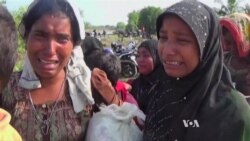More than 400 Rohingya migrants who were pushed back to sea in southern Thailand last week have ended up in Indonesia.
Local fishermen rescued the migrants, many of whom were weak and starving, Wednesday and took them to the eastern province of Aceh.
Most of those rescued are Rohingya, an impoverished mainly Muslim ethnic community from Myanmar, which the government considers stateless, or are Bangladeshis fleeing poverty at home.
Thousands more may be stranded at sea, at risk of death.
The boat’s rescue came as Indonesia and Malaysia agreed to provide temporary shelter to thousands drifting at sea.
Last week, Thai officials pushed them back into international waters after fixing the motor and supplying three days’ worth of food and gas.
Thai Navy Commander Weerapong Nakprasit, in explaining the policy, said, "First of all, we look at the humanitarian need. That’s what we’re doing now, that’s what we always do. But the most important thing is the internal security of our country. If they come across into our waters, they are breaking the law as illegal migrants."
Trafficking ships
Observers estimate that thousands more are still being held on trafficking ships along the coast, to evade arrest.
Some activists and foreign aid organizations have joined the search, hoping to assist the Rohingya, who face poverty and persecution in Myanmar and starvation on the seas.
Matthew Smith, of the Fortify Rights human rights organization, said Myanmar, also known as Burma, needs to be held responsible for the crisis.
"It’s our view that Myanmar deserves to be downgraded to Tier three status in the annual TIP (Trafficking In Persons) report. The reason for that is that human trafficking in Myanmar has been very problematic. This entire exodus of Rohingya from Myanmar involves human traffickers and the root of that is in Myanmar," Smith said.
Conditions on the boat are dire, especially for the children, many of whom fled with their parents from squalid relocation camps in Myanmar's Rakhine state.
Muhamid Abdul, 13, who jumped off a boat last month, said, "While we were on the boat they kept us below deck. When we asked for water they didn’t give to us. And the guards beat us, and some people died from those beatings. I saw men and children’s bodies thrown into the sea."
As more boats packed with Royhinga are reported leaving Myanmar, many activists wonder when the country will be held accountable.





